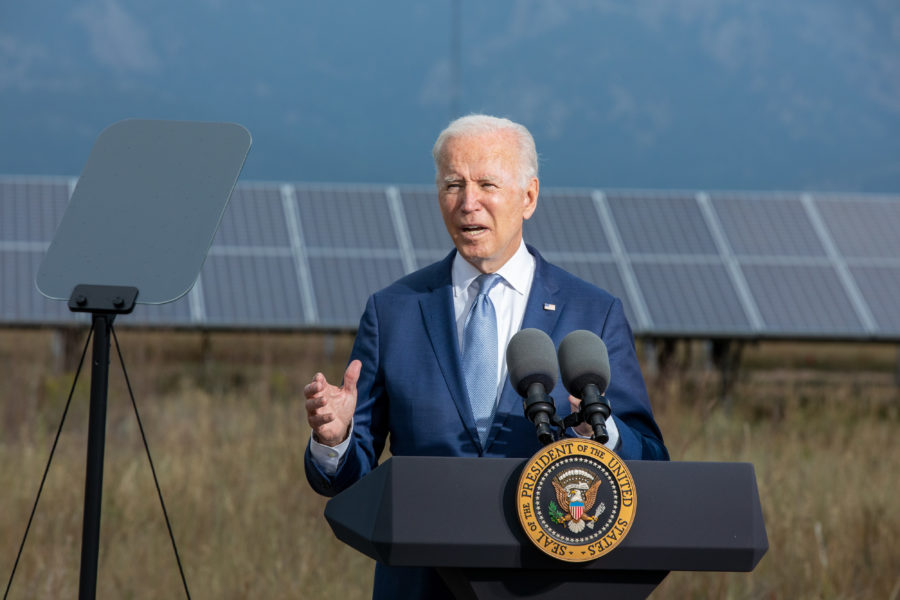Over a year ago, within days of his inauguration, President Biden signed an executive order stating, “We must listen to science — and act. We must strengthen our clean air and water protections. We must hold polluters accountable for their actions. We must deliver environmental justice in communities all across America.”
Then, last summer, the Biden administration announced the Justice 40 initiative would deliver at least 40 percent of the overall benefits from federal investments in climate and clean energy to disadvantaged communities.
As the President’s first year wraps up and he delivers his first State of the Union address, have his administration’s promises to local communities matched reality?
Black, Indigenous (Native American and Latinx) and Brown people, who are the top targets of environmental racism by the oil, gas, coal, and petrochemical industries that most heavily contribute to climate change and toxic pollution levels, are not a priority in the federal government’s fiscal year 2022 budget, which has still not been finalized. Yet they are on the front lines of the disasters caused by climate change.
In its first year, the Biden administration approved 34 percent more oil and gas drilling permits than the first year of the Trump administration. Black, Indigenous and Brown people need a federal budget that addresses the health impacts of such increased oil and gas drilling permits. They need the Biden administration and Congress to show up for them through the federal budget. Yet, the federal government is still operating off President Trump’s budget!
There have been three continuing resolutions passed by Congress since December 2021 to extend the budget deadline. The next deadline for the House and Senate to approve this year’s fiscal budget is two weeks from now, on March 11. Each delay in implementing and funding environmental justice solutions results in more lives being sickened and lost to the harm caused by pollution.
It is time to put pressure on our elected representatives to ensure the federal budget delivers on the administration’s promises to disadvantaged communities.
In the past, there have been times when the federal government has failed to hold polluters accountable and then voters out-organized the polluters in the next election.
In 2010, in my Fort Peck Assiniboine and Sioux (Oceti Sakowin) Tribes community, Murphy Exploration & Production, Pioneer Natural Resources, and Samson Hydrocarbons Company challenged the EPA’s emergency order to pay for monitoring of oil wells that leaked and threatened water safety on the Fort Peck Assiniboine and Sioux Tribes reservation. Two years later, Native Americans in Montana turned out the vote in historic numbers in order to get representation in legislative and executive branches of government and ensure accountability for the water pollution. Since that time, my relatives in Montana have faced backlash by polluters using different strategies and tactics to get rural people to vote against their health interests. But people like you and me, who are the top targets for pollution due to environmental racism and environmental injustice, consistently show up in elections and out-organize the small group of polluters in this country who don’t want to be held accountable.
More recently, polluters like TC Energy (formerly known and doing business as TransCanada) spilled at least 590,000 gallons of crude oil through Keystone pipeline leaks onto rural communities, which especially affect heavily impoverished rural Native American communities. Again, Black, Native American, Latinx, Asian, Jewish, Muslim, LGBTQ2S, and disabled voters turned out the vote in the highest proportion of our communities in 2018 and then again in 2020. Some Native American communities even turned out 99 percent of their registered voters to support the current President and the now-majority Democratic Congress.
All these communities turned out the vote to put the current President and congressional representatives in power so they would lead and bring forth bold environmental justice solutions for a fossil fuel-free future based on good union jobs that people like you and me need. While President Biden cancelled the Keystone XL permit last year, Native American communities still have to deal with the health impacts of fossil fuel pollution and need the federal budget to reflect their needs.
No matter what crisis is facing the administration–the pandemic, Russia’s invasion of Ukraine, or the next crisis–President Biden and Congress must remain focused on implementing solutions for the people who have consistently turned out the vote so their communities can get much-needed environmental justice.
President Biden and Congress can show up for these affected communities through the federal budget and assure accountability and healing for communities most impacted by fossil fuel pollution.
Voting is only one tool in the toolbox to get accountability. People like you must persist in solidarity in between elections and remain engaged in pressuring elected representatives in the executive, legislative, and judicial branches of government at the federal, state, county, and city levels. Remember you are the bosses of the elected representatives and can pressure your elected representatives to do their jobs in implementing the solutions they were elected to pass.
Contact the White House at 202-456-1111 and call the Capitol Hill switchboard at 202-224-3121 to contact your senators and representatives, and demand that environmental justice be prioritized in this year and next year’s federal budgets.

